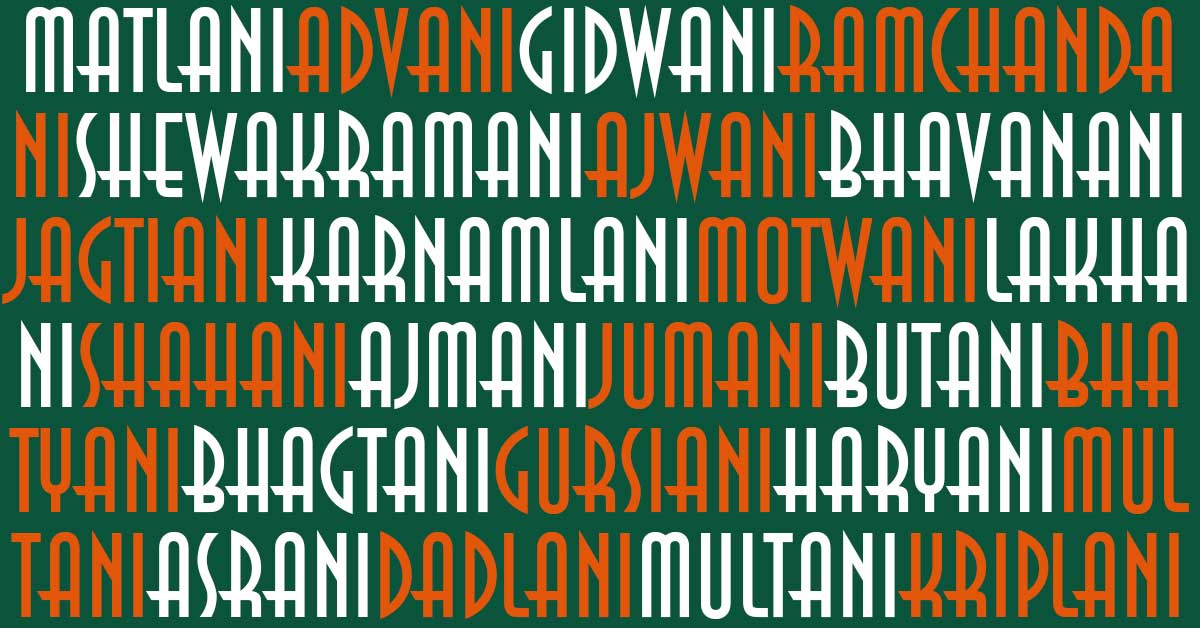
Why do Sindhi surnames end with ani?
|
|
Time to read 4 min
|
|
Time to read 4 min
Names and nomenclatures are important, interesting and fun. It’s why we make it a point to put a lot of thought into the ideas for the products that showcase them. Happily, all this hard work has helped us become India’s most accomplished maker of name plates and, in the process, introduced us to hundreds of names, nicknames, family names, and stories connected to tens of thousands of names. Many of these stories are rather intriguing and we think worth sharing with you; something we are going to do in a series of blog posts centred around answers to quirky questions like ‘Are Dwivedis, Trivedis, and Chaturvedis related?’ or ‘Why do most Sindhi surnames ends with –ani?’ or ‘Why do some surnames have two capital letters?’, and more. And on that note, let’s get right into the history of name-calling.
This question has been researched by Sundar Iyer & Dr. Baldev Matlani in their piece titled 'Unraveling the genesis of Sindhi Surnames' which has been reproduced below.
Consequently, a glance down the History of Hindus reveals that during the Rig Veda period, each family was identified by their Grandfather’s name. Citing an example, the children of Rishi Garg were called ‘Gargeen’, while Dikash (Prajpati’s children) were initially addressed as ‘Dakshyan’ or ‘Dakshyani’. Studies reveal that ‘Yani’ or ‘Yan’ (Suffix) are Sanskrit words, which mean – ‘descendants’ and the same were pronounced in Sindhi as ‘ANI’.
Another explanation of the same states that the word ‘Ani’ has its origin in Sanskrit word ‘Ansh’ meaning progeny or part of the whole. Generally, Sindhis add a suffix ‘Ani’ after the name of their great grandfather and that becomes their Surname.
Shri Berumal Meherchand Advani in his book ‘Sindhi Hindu ji Tareek – History of Hindus in Sindh’ cites the example, the Sindhi surname ‘Gidwani’ originates from the name of Diwan Gidumal, who was the son of Diwan Belamal, who was the son of Diwan Choitram, who was the son of Diwan Adiyomal. The author further points out a very interesting observation that though Diwan Gidumal himself had no children, his brother’s children used his name as their surname, as he was a highly respected individual in the society. Thus, Diwan Gidumal’s brother’s children and their subsequent generation used Gidwani as their surname, emphasizing the fact that they are the descendants of Diwan Gidumal. Dr. Baldev Matlani, currently Reader and former Head of Sindhi Department – University of Mumbai however states, “Though it is said that all Sindhis with the Surname Gidwani are descendants of Gidumal, they don’t necessarily have to be related because at any one given point of time there could have been more than one Gidumal, even though all his future generations would have the family name Gidwani.”
The writer further states in his book that the ‘Advani’ surname has originated from the name of Diwan Adumal. Similarly, the surname Ramchandani belongs to the Sindhis who are the descendants of Ramchand while the surname Shewakramani belongs to the descendants of Shewakram, and so on and so forth.
Berumal Meherchand makes another interesting observation that the surnames Ajwani, Bhavanani, Jagtiani, Karnamlani and the Motwani of Sukkur all belong to the same family, though he has no reasoning for the same.
Speaking on the subject of Sindhi surnames, Dr. Baldev Matlani says, “History reveals, in the ancient days, since the Vedic period until 712 AD, Sindh had only Hindu inhabitants. Subsequently, as a result of the many Arab invasions there were mass religious conversions and people adopted Islam. The Hindus who lived in Sindh in those days either converted to Islam, or having refused to accept Islam were compelled by the then rulers to pay heavy taxes. Many, in the effort to protect their religion left Sindh and settled in places such as Aror and Punjab.
But the interesting part remains, that even those Sindhis who became Muslims, continued with their earlier surnames, and thus you can find Sindhi surnames ending in ANI even amongst Sindhi Muslims, such as Lakhani, Shahani (descendants of Shah Mohammad), etc.
Some of the Gujarati Hindus and Gujarati Muslims too have adopted the practice of adding the suffix ‘ani’ to the name of their grandfather as their surnames. A well-known example of the same is Dhirubhai Ambani of Reliance Industries.
Thus one could deduce that Sindhis adopted the practice of adding the suffix ‘ani’ to their grandfather’s name and came up with their surname. Certain Sindhi Hindus, such as the Ajmanis of Punjab, Jumanis of Sindh who are originally from Punjab, or Butani, Bhatyani, Bhagtani, Gursiani, Haryani etc. are examples of surnames which have evolved by adding the suffix ‘Ani’ to their castes.
One of our patrons, Roger Gursahani, made an extremely interesting observation connecting Sindhis with Italians. Improbable, maybe, but compelling nonetheless.
The -ani suffix comes from the Lucanis and Fratanis of ancient Italy who were seafarers and traders who ended up staying in Indus Saraswati and intermarried with Aryan Hindus. Lucanis and Fratanis are associated with the famous warring tribe, the Samnites, who lost to the Romans and integrated themselves with the ancient Roman republic. After Julius Caesar's death, this would become the ancient Roman empire. Sindhis are the only group of Indians to have 40% ancient Italian blood. 90% of Sindhis have this blood. My mother's surname Hingorani carries this ancient Italian lineage but my surname Gursahani doesn't. Sanjana Galrani, the gorgeous Bengaluru actress, has this Italian bloodline and you can definitely see it with her flair of fashion as well as Italian-influenced sensibility - not to mention her strong personality and intelligence. She is the most stunning contemporary Sindhi woman i have come across!!!